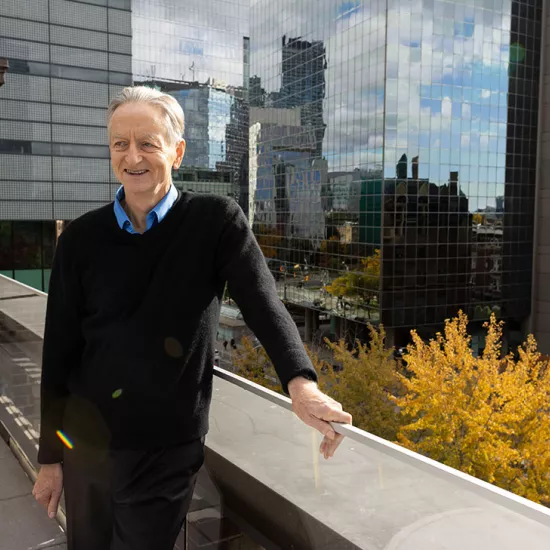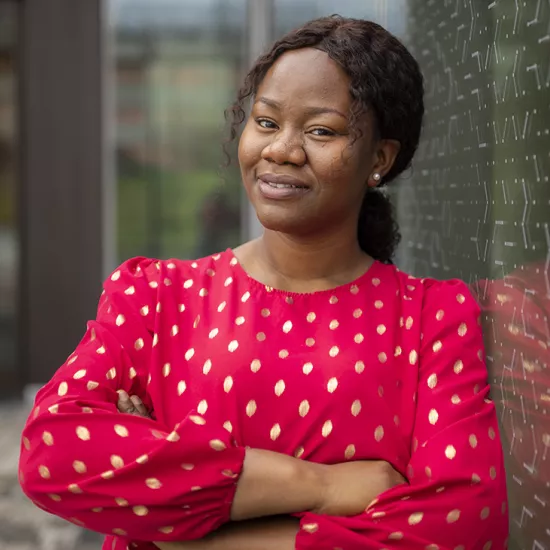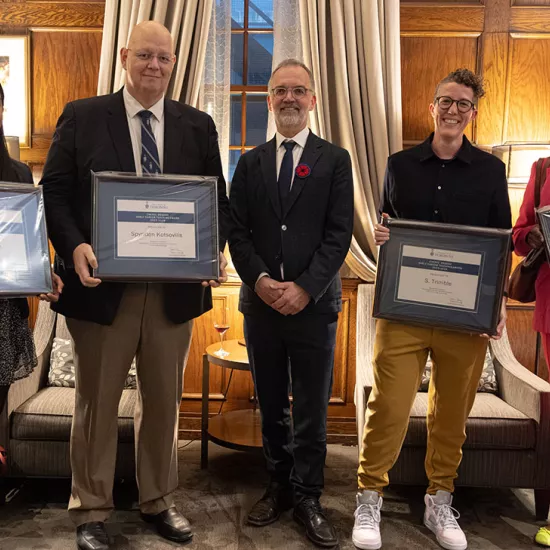Lab Lessons in Session

On December 6, the Research Office’s first Lab Liaisons united the Biology Department with the various staff and faculty members who help construct a smooth and successful research experience. Lab Liaisons, a seminar series open to all staff, aims to explore how the work of campus staff facilitates and enables research on campus.
December’s Lab Liaisons session featured presentations from Biology professors Angela Lange, Joel Levine, and Bryan Stewart. Each biologist shared the research that takes place within their lab and discussed issues raised by the participants gathered for the seminar. The presence of Student Services, Accessibility, and Facilities staff, which included engineers, maintenance workers, and technicians, as well as administrative staff and professors from various departments, demonstrated that research does not simply comprise one researcher, but rather a network of staff who hold varied responsibilities and contribute to the work.
To kick start the event, Professor Angela Lange defined ‘research’ as the product of successful teamwork within the lab, the campus, and the University of Toronto as a whole. Within her lab, Lange and her graduate and undergraduate students study how brain cells communicate to produce appropriate behaviours, concentrating on those associated with digestion and reproduction.
In particular, Lange studies the biology of the ‘Kissing bug,’ or Rhodnius prolixus, an insect that transmits the deadly Chagas’ Disease in South America. By understanding the physiological makeup of this insect, Lange and her collaborators are trying to understand ways that may help reduce the nearly 50 thousand deaths a year that are caused by Chagas’ Disease. Lange provided photos of the various pieces of equipment involved in her research: temperature controlled incubators for insect breeding, and delicate and sophisticated physiological equipment like confocal microscopes and milligram force transducers that populate Lange’s work space; this equipment must remain stable, safe, functioning, and clean each day.
Cue the production team behind-the-scenes. On campus, engineers and electricians, and facilities staff maintain the equipment used by the researchers in their experiments. Within the University of Toronto, radiation and biohazard officers outline the rules and regulations regarding the use of lab equipment.
“If we do not work together, the negative consequences are great,” Lange said in her presentation. Teamwork and communication can prevent accidents and damage that arise when dealing with equipment. For example, the use of insecticides in and around laboratories can kill exotic insects that researchers study, leading to the loss of research findings that may have taken years to accumulate. This loss becomes significant for graduate students whose time at the university remains limited. While signs on doors can help prevent these incidents, direct communication between researchers and staff can avoid the problem altogether. The dynamic nature of seminar events like Lab Liaisons acts as the key to such communication. “We can’t use any of the equipment without the support of the custodial staff,” Lange explained, “We need to keep everything stable, clean and safe in the lab….This is why everything everyone does is important.”
Professor Joel Levine extended the importance of support staff to their impact on students who enter the job market. Emphasizing the ‘bigger picture,’ Levine explained that what takes place inside the lab trains students to be competitive in the market; the condition of a lab thus impacts a students’ success in society. Like Lange, Levine employs insects in his study of the social behaviour and group interaction of flies. Levine believes the rules that govern how flies interact may parallel those of humans.
For Levine, students and researchers succeed through a controlled environment. This means maintaining the equipment utilized in the lab, like the machine that counts RNA, or how much gene is expressed in a fly, and the environment of test flies themselves. Levine keeps his flies in tubes, boxes, and shelves. “How an animal behaves depends on its environment,” Levine explained. In turn, an animal’s behaviour determines the depth to which Levine and his students can draw conclusions about them. Unexpected accidents jeopardize a student’s performance and job training. “Everything beginning from clean labs is linked to a much wider and bigger picture with lots of consequences,” Levine explained, “So we want to say thanks to support staff.”
To wrap up the Lab Liaisons session, Professor and Biology Chair Bryan Stewart offered a dynamic breakdown of how UTM support staff impact his research of the development and function of nerve cells. In his Davis Building lab, Stewart and his students utilize equipment like microscopes and light sources to examine the genetics of fruit flies. A well-maintained research environment allows Stewart and his team to work out the basic science of nerve cell function like memory and learning; Stewart’s research on genes offers insight into health problems like cancer and schizophrenia, diseases that they link to those genes.
Stewart thanked staff for the caretaking of garbage disposal and maintenance, the regulation of hazardous chemicals for health and safety, the renovations, planning and management of lab facilities, the repair of small equipment, and the grants and finance administration organized by departmental units like the Research Office.
While December’s Lab Liaisons informed support staff on what goes on inside laboratories, it also gave researchers a chance to show their appreciation for support staff and their involvement on the research team. Hana Otto, a teaching technician of biology, decided to attend the seminar “to see the interaction between researchers and support staff.” Otto explained that “We need the support staff.…They need to know that without them, we can’t do the research.”
The Lab Liaisons’ informative presentations illustrated how a clean laboratory, functioning incubator, or repaired ceiling can have greater meaning than it may at first appear.
By Jillian Lim
The next session will feature faculty members from the Department of
Chemical & Physical Sciences.



